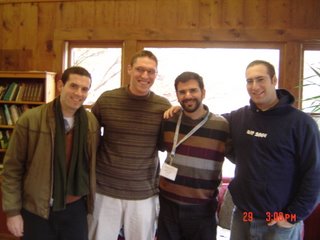As mentioned nearly two weeks ago, I've been spending a lot of time trying to research that topic in order to try to submit it to my school's journal on time in about two weeks' time. However, I realized today that it would not have been as good of a quality as I would have liked it to be - it would have been too rushed, especially as I need to do a lot more research into four main topic areas: 1) medieval and other Talmudic commentators, 2) menstruation, Jewish menstrual taboos, and other perceptions of menstruation, 3) understandings of women's communities, speaking practices, and their relationships to their counterpart [men's] communities, and 4) attitudes about women during Talmudic times.
Anyways, I decided I'd go with another article on sleep, which is good, as it's something into which I've already done a significant amount of research, so I won't be having to do ridiculous hours of research, although there still is much to be done on it. This one, however, in contradistinction to many of my other sleep article interests which are usually on sleep views within a given body of literature, this one will be focusing on Jewish blessings immediately prior to, and after, sleep.
This isn't to say that I am giving up on the article [research] that I have been doing as of late, it's just that I will continue to work on it in earnest in January.
A blog in which Drew Kaplan describes recent goings-on in his life, Jewish stuff, musings on life, etc.
29 November 2006
19 November 2006
On Why I Wanted To Become A Rabbi/Rabbinical Student
It is not uncommon for people to turn to me, on hearing that I am a rabbinical student, and inquire, "How did you decide to do that?"
It was in the summer preceding my last semester in college that I was working at BBYO summer International leadership programs that, after seeing some of the rabbinical/Judaic staff, that I decided that I wanted to become a rabbi myself. That semester I began to look into this possibility. As I had been at YU for a couple of semesters of undergraduate study, I had been aware of RIETS and started thinking about it. However, a chance encounter with Rabbi Mordechai Weiss, who suggested that I look into Chovevei, in that October ('03) would change that. I began to look into YCT, found it to my liking, got accepted, and am here.
It was through my interactions and experiences in BBYO in high school that I came to like conventions/conferences, parliamentary procedure and other bureaucratic staples, leadership, and Jewish activities. Thus, it should come as no surprise, then, that the two biggest motivations for me were leadership and doing something Jewish to go into the rabbinate. In addition to those, or rather, similarly, I had bought into the message somewhere along the line that the Jewish people needs some good leaders - and I thought I could help. There were some additional reasons such as learning Torah/Judaism while in the process of training for the profession (which is a big plus, as I was not raised tremendously observant and/or connected to tradition), the ability to go to conferences, and also not have to sit behind a desk all day, but rather do something that not only is important and impacts upon peoples' lives, but also has a variety of various things, which makes for a minimum of monotony. There may be other reasons, but I hope this suffices for now. (Oh, yeah, also going out to help guide people in doing Jewishly - I find that to be very powerful. Just seeing people at Chabad houses, or many Jews who know so little about their tradition makes me want to help teach them, etc. (I'm talking about those who are interested already - not trying to go out there and ramming it down peoples' throats who don't want it.).)
It was in the summer preceding my last semester in college that I was working at BBYO summer International leadership programs that, after seeing some of the rabbinical/Judaic staff, that I decided that I wanted to become a rabbi myself. That semester I began to look into this possibility. As I had been at YU for a couple of semesters of undergraduate study, I had been aware of RIETS and started thinking about it. However, a chance encounter with Rabbi Mordechai Weiss, who suggested that I look into Chovevei, in that October ('03) would change that. I began to look into YCT, found it to my liking, got accepted, and am here.
It was through my interactions and experiences in BBYO in high school that I came to like conventions/conferences, parliamentary procedure and other bureaucratic staples, leadership, and Jewish activities. Thus, it should come as no surprise, then, that the two biggest motivations for me were leadership and doing something Jewish to go into the rabbinate. In addition to those, or rather, similarly, I had bought into the message somewhere along the line that the Jewish people needs some good leaders - and I thought I could help. There were some additional reasons such as learning Torah/Judaism while in the process of training for the profession (which is a big plus, as I was not raised tremendously observant and/or connected to tradition), the ability to go to conferences, and also not have to sit behind a desk all day, but rather do something that not only is important and impacts upon peoples' lives, but also has a variety of various things, which makes for a minimum of monotony. There may be other reasons, but I hope this suffices for now. (Oh, yeah, also going out to help guide people in doing Jewishly - I find that to be very powerful. Just seeing people at Chabad houses, or many Jews who know so little about their tradition makes me want to help teach them, etc. (I'm talking about those who are interested already - not trying to go out there and ramming it down peoples' throats who don't want it.).)
16 November 2006
Spending My Time Researching Instead of Blogging
As could be gleaned from my posting from two weeks ago, I have been endeavoring to write an article for the third volume of Milin Havivin on a topic brought up there (keep reading to find out specifically on what). Although with any article, research is utterly necessary. And there is much research to be done. However, I don't mind all that much, because I have found that researching is half the fun of any article (the other half is taken up largely by thinking about the topics involved and trying to think about things in a variety of ways, with only a little bit being the actual writing of the article). So, I have been spending a lot of time researching the topic, in addition to thinking about it. It first started when we dealt with the subject in a fairly straightforward halakhic (by halakhic, I mean a survey of the halakhic sources) look at it in September, and then became utterly compelled to write about it after having giving it considerable thought during the rabbinical student retreat (which unfortunately meant that I was largely preoccupied with my thoughts about this topic (and another matter, as well) rather than being so thoughtfully engaged with the programming (but don't get it twisted, I was learning quite a bit from the lectures, etc. taking place there - I just wasn't my usual talkative, questioning, and engaged self)). So, what is this topic, per se? {drumroll...} I'm working on trying to figure out what it was that compelled the Jewish women to exercise a stringency upon themselves to wait a full week of no menstrual blood after they had finished menstruating in contradistinction to what the book of Leviticus (ch. 15) laid out and as interpreted by the rabbis. Although I need to figure out how to more concisely and articulately spell that out when trying to discuss this, hopefully enough googling and wikipediaing will help you understand it more if you are interested. Anyways, that's my new found interest. Hopefully, I will have my article done in time for the deadline in less than a month.
12 November 2006
New Glasses
Re-Imagining the Synagogue Rabbinical Student Retreat
 Two weekends ago, immediately following YCT's hike, I took part in a Panim's Re-Imagining the American Synagogue rabbinical student retreat at the Isabella Freedman Jewish Retreat Center in CT. There, I, along with two other students fro
Two weekends ago, immediately following YCT's hike, I took part in a Panim's Re-Imagining the American Synagogue rabbinical student retreat at the Isabella Freedman Jewish Retreat Center in CT. There, I, along with two other students fro m YCT, came together with students from several other rabbinical seminaries (such as AJR, Aleph, JTS, UJ, HUC-NY, HUC-LA, RRC, and Hebrew College) and a couple of rabbis and an educator. I enjoyed it, as I got to s
m YCT, came together with students from several other rabbinical seminaries (such as AJR, Aleph, JTS, UJ, HUC-NY, HUC-LA, RRC, and Hebrew College) and a couple of rabbis and an educator. I enjoyed it, as I got to s pend time working on trying to create some sort of vision towards my rabbinate and future shul(s), which was goo
pend time working on trying to create some sort of vision towards my rabbinate and future shul(s), which was goo d. What was tough about it was trying to figure out precisely how difficult things are as well as to understanding what the status quo was in the way shuls function and how to be aware of these things and to be on my guard lest the usual pitfalls befall me, as well.
d. What was tough about it was trying to figure out precisely how difficult things are as well as to understanding what the status quo was in the way shuls function and how to be aware of these things and to be on my guard lest the usual pitfalls befall me, as well.Also, as happens to me in any pluralistic setting (for instance, the El Salvador trip), I derived from the experience a greater energy and excitement about my position to go out and help American Jewry and glad where I am. (I also felt that, as Orthodox rabbinical students, we were more textually dexetrous. No, that was not meant as a shot at any of the other schools or movements, just a sense I got.)
For more pictures, see some of the other participants' albums: One album. And another: set one, set two.
02 November 2006
My First Attempt at a Critical Text
My first attempt at a critical text: a small סוגיא (section) of Niddah 67b. Since I did not provide a translation there in that MS Word file, I will translate the section into English (as opposed to Slotski's Vilna printed edition-based translation) here.
Rav Idi, son of Avin, established in Narash to immerse on the eighth day, because of lions [being around at night].
Rav Aha, son of Ya'akov, [established the same] in Fafunia, because of robbers/thieves [at night time].
Rav Yehudah [established the same] in Pumbedisa, because of the cold [nights].
Rava [established the same] in Mehoza, because of the closing of the gates [at nighttime].
Rav Papa said to Rava: Since, nowadays, all of them are considered to be possible zavos, let them immerse themselves in the day.
He said to him: Because of Rabbi Shime'on, as it is taught....
Subscribe to:
Comments (Atom)
